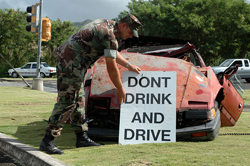House Representative Champ Edmund Proposes Orange License Plates for DUI Convictions
 Montana State Representative Champ Edmunds sponsored a new DUI bill, HB 276, which seeks to require DUI offenders to use orange license plates on their vehicles. Similiar to Ohio’s yellow license plate practice, an orange Montana license plate would identify a driver as one who has been previously convicted of drunk driving.
Montana State Representative Champ Edmunds sponsored a new DUI bill, HB 276, which seeks to require DUI offenders to use orange license plates on their vehicles. Similiar to Ohio’s yellow license plate practice, an orange Montana license plate would identify a driver as one who has been previously convicted of drunk driving.
KFBB.com said some may view the orange license plates as a scarlet letter. The license plates would be in use by the DUI offender for five years, and the license plate number would begin with “DUI”. The bill would also require everyone with a past drunk driving conviction to change out their license plates for the new orange plates. The supporters of the bill say that offenders should put their criminal history on display in an attempt to shame them.
Opponents of HB 276 say the financial strain of a drunk driving conviction is enough punishment for DUI offenders. In addition to the orange license plate suggestion, HB 276 also adds $100 in additional fines for the special orange DUI plate.
 What are the laws in Minnesota regarding
What are the laws in Minnesota regarding  A new Senate bill in Indiana, Senate bill 168, has the potential to change how all
A new Senate bill in Indiana, Senate bill 168, has the potential to change how all 
